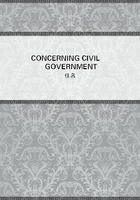
第31章
Of the Ends of Political Society and Government 123. IF man in the state of Nature be so free as has been said, if he be absolute lord of his own person and possessions, equal to the greatest and subject to nobody, why will he part with his freedom, this empire, and subject himself to the dominion and control of any other power? To which it is obvious to answer, that though in the state of Nature he hath such a right, yet the enjoyment of it is very uncertain and constantly exposed to the invasion of others; for all being kings as much as he, every man his equal, and the greater part no strict observers of equity and justice, the enjoyment of the property he has in this state is very unsafe, very insecure. This makes him willing to quit this condition which, however free, is full of fears and continual dangers; and it is not without reason that he seeks out and is willing to join in society with others who are already united, or have a mind to unite for the mutual preservation of their lives, liberties and estates, which I call by the general name- property.
124. The great and chief end, therefore, of men uniting into commonwealths, and putting themselves under government, is the preservation of their property; to which in the state of Nature there are many things wanting.
Firstly, there wants an established, settled, known law, received and allowed by common consent to be the standard of right and wrong, and the common measure to decide all controversies between them. For though the law of Nature be plain and intelligible to all rational creatures, yet men, being biased by their interest, as well as ignorant for want of study of it, are not apt to allow of it as a law binding to them in the application of it to their particular cases.
125. Secondly, in the state of Nature there wants a known and indifferent judge, with authority to determine all differences according to the established law. For every one in that state being both judge and executioner of the law of Nature, men being partial to themselves, passion and revenge is very apt to carry them too far, and with too much heat in their own cases, as well as negligence and unconcernedness, make them too remiss in other men's.
126. Thirdly, in the state of Nature there often wants power to back and support the sentence when right, and to give it due execution.
They who by any injustice offended will seldom fail where they are able by force to make good their injustice. Such resistance many times makes the punishment dangerous, and frequently destructive to those who attempt it.